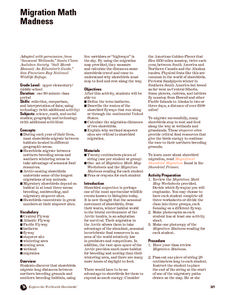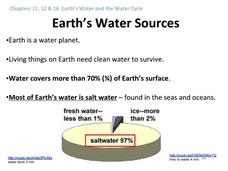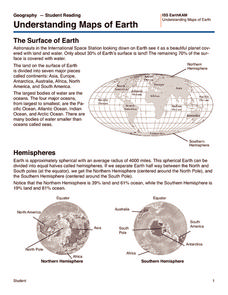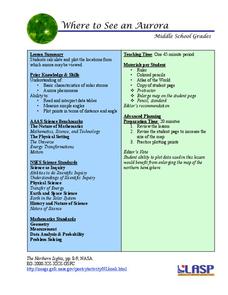Polar Trec
Swan Savvy
Just like so many other birds, swans migrate during the cold winter months. Your class can gain a better understanding of migration and bird life as they act out some of the activities common to the tundra swan. They make a nest, sit on...
Curated OER
Bering Sea Buffet - A Foodweb Activity
Life in the Bering Sea, food webs, and the ocean ecosystem are introduced with a map activity. The lesson starts as kids explore maps and images of the Bering Sea, then it kicks into high gear as they start to discuss the types of...
Curated OER
World History Pre-Assessment
What do the members of your class already know about world history? This is a fabulous pre-assessment that will illustrate the varying levels of general world history knowledge among your young historians that you can use to inform your...
Prince William Network
Migration Math Madness
A great way to incorporate math into life science, this lesson has learners measure migratory routes on a map and calculate the actual distance that shorebirds on the routes would cover. Learners compute the distance covered in both...
Prince William Network
The Incredible Journey
Divide your school gym into breeding grounds and non-breeding grounds so that your zoologists can play a game simulating the seasonal migration of shorebirds. Players pick one of the included game cards and follow its directions, which...
Prince William Network
Migration Headache
During this game, kids become migratory shorebirds and fly among wintering, nesting, and stopover habitats. If they do not arrive at a suitable habitat on time, they do not survive. Catastrophic events are periodically introduced that...
Curated OER
The Oceans, Waves, Tides & Currents
Your introductory lesson to oceanography can be outlined with this apropos presentation. It touches on the physical features of the ocean floor, waves, tides, and currents. One small issue is that some of the graphics are not of the...
Curated OER
Earth's Water Sources
General facts about Earth's water sources, human use, and the water cycle are outlined by this presentation. Slide three has a grammatical error and slide nine refers to the local watershed of the author, so you will need to make a few...
Polar Bears International
Taking Action!
Motivate young scientists to stand up and take action with this environmental science instructional activity. To begin, the class works in small groups brainstorming actions that support the conservation of the earth before creating and...
National Gallery of Canada
Picture This!
Introduce your class to Inuit prints and use these artworks as inspiration for a printmaking activity. Pupils make stories to go along with the images and then come up with their own heroic moments to illustrate. They take moments from...
National Gallery of Art
Impressive Prints
Explore printmaking with a discussion and project. Pupils first view and talk about various examples of prints and cover positive and negative space. They then come up with fictional animals and make prints of their creature using...
National Gallery of Canada
Morphosis
Experience anthropomorphism and metamorphosis in action with flipbooks! Instead of giving human characteristics to animals, though, pupils will show a transformation from human to animal or vise versa through their drawings. The...
National Gallery of Canada
My World
Art can tell viewers about an artist's personality and background. Have your learners look at Inuit art and consider subject matter and how it relates to the artist and his or her world. The related art project requires pupils to create...
Institute for Geophysics
Understanding Maps of Earth
Here is your go-to student resource on primary geography concepts, including facts about the surface of the earth and its hemispheres, latitude and longitude, globes, types of maps, and identifying continents and oceans.
Curated OER
Section 1: Analogies
Introduce your freshmen to analogies with this packet of prompts that also includes strategies for solving these critical thinking puzzles.
ReadWriteThink
Compare and Contrast
Read about the ways that different cultures set up homes with a set of reading activities. Learners read short paragraphs that cover one or more different ideas, and answer four questions about what they have read, including whether or...
Teach Engineering
What's Wrong with the Coordinates at the North Pole?
Here is an activity that merges technology with life skills as individuals use Google Earth to explore the differences between coordinate systems and map projections. The self-guided instructional activity is the fourth segment in a...
PHET
Where to See an Aurora
Where can you see an aurora in North America? After completing an astronomy activity, scholars can locate the exact coordinates. Pupils plot points of the inner and outer ring of the auroral oval and answer questions based on their...
NOAA
Community Ecology and Sampling
Seamounts in the Coral and Tasman Seas are home to more than 850 different species. Groups explore hydrothermal vents, researching the organisms found there and their energy source. They also learn about seamounts, exploring their unique...
Messenger Education
Snow Goggles and Limiting Sunlight
Why would someone need contact lenses that offer UV protection? With a 28-page packet full of instruction and worksheets, learners discuss solar radiation and its potential harm to eyes. They make snow goggles similar to ones hunters...
Polar Trec
Where is the World's Water?
Scholars discover the amount of the Earth's water in various locations such as the ocean, ice, the atmosphere, etc. They then make a model of the how much water those percentages represent. Finally, analysis questions bring the concepts...
Polar Trec
Bioaccumulation of Toxins
In 2015, Peter Cook found that sea lions with high levels of exposure to toxins suffered permanent brain damage if they survived at all. Scholars learn about the accumulation of toxins at various levels of the food chain. Using...
Howard Hughes Medical Institute
Modeling Trophic Cascades
In the ecological game of who eats who, one small change can have a big impact! Individuals create food chains in an array of ecosystems, then determine what happens to organisms in the chain when one organism changes its feeding...
Reed Novel Studies
Julie of the Wolves: Novel Study
Blood may not always be thicker than water. Julie, in Julie of the Wolves, soon depends on a wolf pack to be her family. Scholars read about Julie's adventures as they complete sentences with vocabulary words, answer comprehension...
Other popular searches
- Arctic Animals
- Arctic Food Chain
- Arctic Ocean
- Arctic Ocean Diorama
- Preschool Arctic Animals
- Arctic Plants and Animals
- Arctic Region
- Arctic Circle
- Arctic Hare
- Arctic Peoples
- Arctic Predators
- Global Climate Change Arctic

























